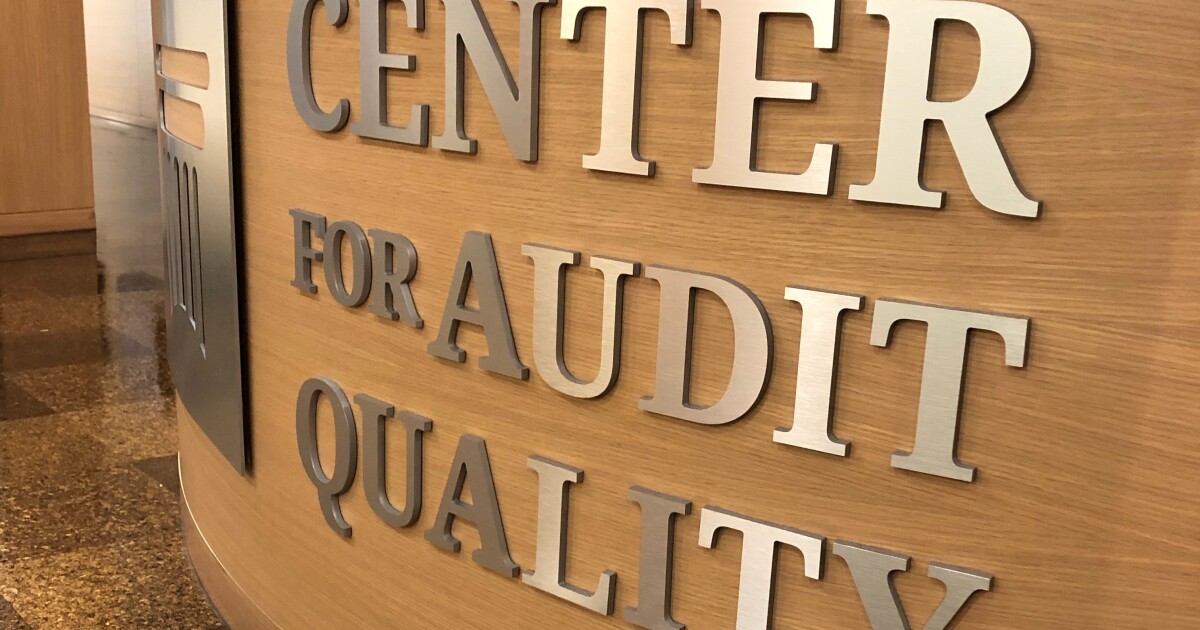Accounting
Interest in accounting rises among students
Published
1 month agoon

Total interest in accounting careers has risen across Hispanic, Asian American Pacific Islander and white students since 2021, while Black students have shown a minimal decrease in interest.
The Center for Audit Quality and Edge Research surveyed 3,487 high school and college students for the latest edition of their annual
Thee research indicates that Hispanic students have shown the most significant increase in interest — with their familiarity with accounting increasing from 37% in 2021 to 50% in 2024, and total interest rising from 29% to 37%. Meanwhile, Black students have been the hardest group to move, with familiarity shifting from 40% to 40%, and total interest tapering off from 33% to 32%. AAPI students’ familiarity rose from 34% to 43%, and their total interest rose from 23% to 34%. White students’ familiarity increased from 45% to 49%, and their total interest rose from 28% to 33%.

Courtesy of the Center for Audit Quality
Exposure to accounting is a significant influencing factor on student interest. The data shows that Black students are the least likely to know an accountant personally (29%), compared to Hispanic students (37%) and AAPI and white students (38%). Additionally, Black and Hispanic students have less access to high school accounting courses (37% and 40%, respectively) but show equal interest when such courses are available.
In terms of perception, the research found improvements across all demographic groups, particularly in how they view accounting’s value proposition, long-term earning potential and work-life balance. The percentage of students who agreed that accounting careers offer good long-term earning potential increased 8.5 points on average across all groups from 2021 to 2024. And the percentage of students who see accounting careers as stable or always in demand increased 6.5 points on average across all groups.
However, starting salaries that are not competitive compared to jobs in finance and tech remain a hurdle to recruiting efforts. This is particularly true for recruiting Black students, where 31% strongly agree they can make a higher starting salary with a major or concentration other than accounting, and 60% who strongly/somewhat agree. The concern about compensation is least pronounced among white students, with 22% strongly agreeing with the aforementioned statement, and 56% strongly or somewhat agreeing.
(Read More:
The report identified 10 key implications and opportunities from its research:
- Economic messaging resonance;
- Industry alignment;
- Targeted outreach to Black students;
- Focus on gender parity;
- Barrier reduction;
- Early exposure;
- Digital first engagement;
- Parent and counselor education; and,
- Salary transparency.
“In a time of economic uncertainty, young people are making deliberate choices to prioritize stability and flexibility in their careers like never before,” Liz Barentzen, vice president of talent at the CAQ, said in a statement. “This presents a challenge, but also a tremendous opportunity for the accounting profession. For students, especially those from underserved communities, this isn’t just about employment. It’s about building a future and creating generational wealth.”
You may like
Accounting
Tax Strategy: Provisions of the House tax bill the Senate is most likely to scrutinize
Published
3 hours agoon
June 2, 2025
The Senate has a stated goal to complete work on the budget reconciliation bill by the beginning of July 2025. Anticipating that the Senate will make modifications to the House version, the bill could then go back to the House for a vote or go to a House/Senate conference to work out differences and then get another vote in both chambers. It appears likely that a July 1 deadline for finalization of the bill will be difficult to achieve.
The most critical deadline Congress is facing for the legislation is enactment of additional government borrowing authority before the current authorization limit is reached, which is expected to be sometime during August. As we approach August, the specific deadline should become clearer. Expect work on the bill to continue toward that deadline.
The bill passed the House by only a one-vote margin. Several Republican senators have said that they want changes to the House bill. However, no Republican senator is saying that they want to defeat the bill. They just want to make it more beautiful. The following are some of the key areas of focus for possible Senate modification.
The SALT deduction limit
The House bill raises the state and local tax deduction limit from $10,000 to $40,000, with a last-minute increase from $30,000 to win over enough Republican House members from high-tax states. The Senate seems inclined to oppose any increase in the limit. There are no Republican Senators from those same high-tax states, such as California, Illinois, Massachusetts, New Jersey, and New York, to form a similar bloc seeking relief that exists in the House. However, the Senate also would realize that eliminating the House SALT limit increase could make it difficult to get passage of the bill next time around in the House without the SALT provision.
This is the type of difference where a compromise might be reached in a conference committee on the bill. One concern is the cost of increasing the deduction limit, and that the increase benefits mostly wealthier taxpayers. Coming up with some additional revenue offsets or cost reductions could help reach a compromise on this issue.
Temporary provisions
The House, to meet its budget targets, has proposed several temporary provisions. Most of the extensions of the individual provisions of the Tax Cuts and Jobs Act have been made permanent. However, the new deductions for tips and overtime pay, as well as several other provisions, are only around for as short a time as four years. Some Senate Republicans would prefer to try to make provisions permanent when possible.
The main issue with making them permanent would be coming up with additional revenue or cost cuts to pay for permanence within the agreed-budget parameters. Republicans have already agreed that they will take the position that extensions of provisions of the Tax Cuts and Jobs Act do not have to be paid for since they are merely extensions of provisions already in the tax law. Those extensions, of course, still add to the deficit.
Other potential sources of revenue offsets include cost cuts. However, some Republican senators are already uncomfortable with the Medicaid and Supplemental Nutrition Assistance Program (SNAP, or Food Stamps) cuts in the House version. Other sources of revenue include reductions in the federal workforce; however, the efforts of the Department of Government Efficiency have so far not achieved the reductions that had been hoped.
Tariffs could also provide a possible source of revenue; however, the level of tariffs keeps changing and it might be hard to settle on an expected level of tariff revenue over the next 10 years. Republicans are also fond of projecting economic growth resulting from the tax cuts in the legislation. Those projections often appear overly optimistic, and the Congressional Budget Office is usually less optimistic about projected economic growth.
Clean energy credits
The House bill eliminates or phases down many of the clean energy credits created by the Inflation Reduction Act in 2022. It is primarily the individual tax breaks for clean energy vehicles and energy-efficient homes that are eliminated. The argument is that clean vehicles and energy-efficient homes no longer need tax incentives, although that might not be true for some of these credits, especially the credit for alternative fuel charging stations.
In addition to accelerating the phase-outs for some of the business-focused clean energy credits, the bill also restricts their use by foreign entities and eliminates transferability of some of the credits.
Republican Senators are concerned about the possible adverse impact on clean energy projects that have been proposed or are underway in their states. They want the tax credits that incentivized those projects to be available through to completion. These include the Code Sec. 45Y Clean Electricity Production Credit and the Code Sec. 48E Clean Electricity Investment Credit, which under the House bill would end for projects where construction is not commenced until more than 60 days after enactment. Other affected credits include the Code Sec. 45X Advanced Manufacturing Production Credit, the Code Sec. 45U nuclear credit, and the Code Sec. 45Q carbon recapture credit.
Repeal and phase-down of these clean energy credits does provide a source of revenue to help pay for other tax cuts. Therefore, Republican Senators who want to facilitate state projects may be comfortable with just stretching out the phase-down period a little further.
Child Tax Credit
The House has proposed to increase the Child Tax Credit to $2,500 through 2028. After that, the credit would fall to $2,000 but be indexed for inflation. Only up to $1,400 would be refundable. Some Republican senators would prefer to make further enhancements to the Child Tax Credit to assist lower income families. This would probably not be opposed in the House provided that a favorable revenue offset can be identified.
Summary
It will be a few weeks before the stated deadline for the Senate to have completed work on and voted on the bill will have arrived. By that time, the date by which the government will have reached the limit of its borrowing authority will have been more narrowly identified. The deficit hawks in the House may find that they have found more effective support for their position on debt reduction in the Senate. The SALT limitation hawks in the House may find little support for their position among Senate Republicans.
Even as a Senate bill nears completion, it will likely differ in many respects from the House bill, including in the areas discussed herein, and the House and Senate will have until sometime in August to resolve their differences. Those differences will likely somehow get resolved, since Republicans generally view not passing a bill as the worst of all alternatives. It will be the pressure of the August deadline that will force those compromises.
Accounting
How tax and tariff questions are leaving investors in limbo
Published
4 hours agoon
June 2, 2025

Even after the biggest May jump in 35 years for the S&P 500, investors’ understandable confusion about the future of tax and tariff policies and inflation is driving a lot of anxiety.
The S&P’s value
Beyond questions of how potential tariffs might affect inflation,
Many high net worth and ultrahigh net worth clients who work with David Lesperance, the founder of immigration tax and law advisory firm
READ MORE:
Responding to uncertainty
In the case of Lesperance’s ultrawealthy clients, that means taking steps as drastic as seeking residency outside of the country and offshore citizenship in anticipation of a recession next year and the political pendulum swinging back toward Democrats, who might adopt taxes on unrealized gains or that target billionaires or millionaires. Other investors may be acting toward much more immediate needs or
Out of 373 retirees polled between March 25 and April 17 as part of the Schroders
“While advisors and clients can’t control Washington, they can control how they respond,” Boyden continued. “Sticking to a financial plan, staying invested through market cycles, and resisting the urge to make emotional decisions are all variables within their control. Periods of heightened uncertainty present an opportunity for advisors to deepen relationships by communicating with clients more frequently to help them reassess goals, understand allocations and feel more confident in their strategy. Our data shows that many retirees are without a plan or professional guidance — this void is an opportunity for advisors.”
READ MORE:
Answering the unknowables
Those retirees and other investors are struggling to find answers that aren’t even clear to some of the top experts trying to figure out the form and implications of taxes and tariffs in the future. Ongoing court cases have placed
But the bill garnered enough support to pass the House by one vote and the backing of influential groups like the pro-business
The outlook has grown so blurry that David Kelly, the chief global strategist of JPMorgan Asset Management, compared investors’ task of figuring out next steps to the challenge of five argumentative siblings putting together a 1,000-piece puzzle.
“Despite political tensions, ongoing policy changes and heightened inflation and recession concerns, 2025 so far has generated positive returns for investors, with the S&P 500 and the bond markets registering small gains and international stocks posting much larger increases,” Kelly said in a June 2 note. “This is no time for complacency, however. The outlook for the economy is for just slow GDP growth, smaller job gains and temporarily higher inflation. This should translate into sticky interest rates, decelerating earnings growth and a falling dollar. At the start of the year, given valuations and portfolio concentration, it made sense for investors to rebalance away from U.S. mega-cap growth stocks and towards more defensive U.S. stocks, international equities and alternatives. Five months into the year, while the macro jigsaw remains complicated, the same advice seems warranted.”
READ MORE:
Legislative agenda
As for the tax and spending bill, President Trump’s Republican allies in the Senate have discussed a possible goal of passing the massive legislation by July 4. But voting the legislation through the Senate could prove difficult, according to Jonathan Traub, a managing principal and the leader of the Tax Policy Group at consulting and professional services firm
“For both policy and procedural reasons, we can expect changes to the current legislation,” Traub said in a statement after the House passage of the bill last month. “It will remain a tremendous challenge for Republican leaders to keep near unanimity among their members given the push and pull on so many major components of the bill.”
Provisions of the bill as wide-ranging as the level of tax brackets and states’ ability to
“There’s a whole bunch of opportunity, but in order to do that you need to get a whole bunch of planning in place,” Lesperance said. “It’s very interesting on the planning side, but people are scrambling, and they’re making educated bets.”

Significant changes are in store for President Donald Trump’s signature $3.9 trillion tax-cut bill as the Senate begins closed-door talks this week on legislation that squeaked through the House by a single vote.
Senate Republican leaders are aiming to make permanent many of the temporary tax cuts in the House bill, a move that would increase the bill’s more than $2.5 trillion deficit impact. But doing so risks alienating fiscal hawks already at war with party moderates over the bill’s safety-net cuts.
It amounts to a game of chess further complicated by the top Senate rules-keeper, who will decide whether some key provisions violate the chamber’s strict rules. Jettisoning those provisions — which include gun silencer regulations and artificial intelligence policy — could sink the bill in the House.
House Republicans’ top tax writer, Representative Jason Smith, on Friday said that senators need to leave most of the bill untouched in order to ensure it can pass the House in the end.
“I would encourage my counterparts, don’t be too drastic, be very balanced,” he said.
The wrangling imperils Republicans’ goal of sending the “Big, Beautiful Bill” to Trump’s desk by July 4. But the real deadline is sometime in August or September, when the Treasury Department estimates the US will run out of borrowing authority.
The House bill would raise the government’s legal debt ceiling by $4 trillion, which the Senate wants to increase to $5 trillion in order to push off the next fiscal cliff until after the 2026 congressional elections.
That’s just one of the major changes the Senate will weigh in the coming weeks. Here are others:
Permanent business breaks
Senate Finance Chairman Mike Crapo’s top priority is making permanent the temporary business tax cuts that the House bill sunsets after 2029. These are the research and development tax deduction, the ability to use depreciation and amortization as the basis for interest expensing, and 100% bonus depreciation of certain property, including most machinery and factories.
Senate Republicans plan to use a budget gimmick that counts the extension of the individual provisions in the 2017 Trump tax bill as having no cost. That gives them room to make the additional business tax cuts and possibly extend some of the new four-year individual cuts in the House bill like those on tips and overtime.
Deficit hawks could demand new offsets, however, either in the form of spending cuts or ending tax breaks like one on carried interest used by private equity.

Stefani Reynolds/Bloomberg
The SALT cap
The House expanded the state and local tax deduction limit from $10,000 to $40,000 to get blue-state Republicans behind the bill. But SALT isn’t an issue in the Senate, where high-tax states like California, New York and New Jersey are represented by Democrats.
“I can’t think of any Senate Republicans who think more than $10,000 is needed and I can think of several who think the number should be zero,” said Rohit Kumar, a former top Senate staffer now with Big Four firm PwC.
That includes deficit hawks like Louisiana’s John Kennedy, who has balked at the House’s SALT boost.
Senators could propose keeping the current $10,000 SALT cap as a low-ball counter, forcing the House to settle from something in the ballpark of a $30,000 cap, Kumar said.
The Senate could also change new limits on the abilities of passthrough service businesses to claim SALT deductions.
Green energy tax credits
Moderate Republicans in the Senate are pushing back on provisions in the House bill that gut tax credits for solar, wind, battery makers and several other clean energy sectors.
Senator Lisa Murkowski of Alaska said she’s seeking to soften aggressive phaseouts of tax credits for clean electricity production and nuclear power. She has the backing of at least three other Republicans, giving her enough leverage to make demands in a chamber where opposition from four GOP senators would kill the bill.
Their demands will run headlong into ultraconservatives, who already think the House bill doesn’t get rid of tax benefits for clean energy fast enough.
Medicaid, Food Stamps
Senators Rand Paul of Kentucky, Rick Scott of Florida, Mike Lee of Utah and Ron Johnson of Wisconsin say they’re willing to sink the bill if it doesn’t cut more spending.
“I think we have enough to stop the process until the president gets serious about reductions,” Johnson said recently on CNN.
They haven’t made specific demands yet, but they could start off where the House Freedom Caucus fell short — cutting the federal matching payment for Medicaid for those enrolled under Obamacare and further limiting federal reimbursement for Medicaid provider taxes charged by states.
Conservatives’ demands are in stark contrast to Republican senators already uncomfortable with the new Medicaid co-pays and state cost-sharing for Medicaid and food stamps in the House bill. Senators Josh Hawley of Missouri, Susan Collins of Maine, and Jim Justice and Shelley Moore Capito of West Virginia join Murkowski in this camp.
Boosting their case is Trump, who told the Freedom Caucus to stop “grandstanding” on more Medicaid cuts.
Regulatory matters
There’s an extensive list of regulatory matters in the House bill that could be struck if they are found to break Senate rules for averting a filibuster and passing the legislation by a simple majority.
Provisions likely to be challenged for not being primarily budgetary in nature include a repeal of gun silencer regulations, preemption of state artificial intelligence regulations, staffing regulations for nursing homes and abolishing the Direct File program at the Internal Revenue Service.
The House bill’s provisions limiting the ability of federal judges to hold administration officials in contempt, ending funding for Planned Parenthood, requiring congressional review of new regulations and easing permitting of fossil fuel projects are also vulnerable.
The biggest Senate rules fight will be over using the “current policy” budget gimmick to lower the cost of the bill. Senate Republican leaders could explore bypassing rules keeper Elizabeth MacDonough if she finds the accounting move breaks the rules.
Battles over these provisions could take weeks.
“I think it would be very difficult to get it out of the Senate quickly,” said Bill Hoagland, a former top Republican Senate budget staffer now with the Bipartisan Policy Center.
Spectrum sales as pay-fors
A major auction of government radio spectrum that would generate an estimated $88 billion in revenue is another unresolved fight.
Ted Cruz of Texas, the Senate Commerce chair, backs the spectrum sale but Senator Mike Rounds of South Dakota has vowed to protect the Defense Department, which has warned auctioning off its spectrum would degrade its capabilities and cost hundreds of billions for retrofits.
The proposal would free up key spectrum for wireless broadband giants like Verizon and Elon Musk’s Starlink.
The estate tax
Majority Leader John Thune and 46 other Republican senators back a total repeal of the estate tax, which would likely cost several hundred billion dollars over a decade, benefiting the heirs of the richest 0.1%. That could make it too pricey for the Senate to include.
The House bill permanently increases the estate tax exemption to $15 million for individuals and $30 million for married couples, with future increases tied to inflation.

Tariffs are my only concern, ‘Big Short’ investor Steve Eisman says

Trump pauses Social Security benefit cuts over defaulted student loans

Tax Strategy: Provisions of the House tax bill the Senate is most likely to scrutinize

New 2023 K-1 instructions stir the CAMT pot for partnerships and corporations

The Essential Practice of Bank and Credit Card Statement Reconciliation

Are American progressives making themselves sad?
Trending
-

 Personal Finance1 week ago
Personal Finance1 week agoHow appealing property taxes can benefit new homeowners
-

 Blog Post1 week ago
Blog Post1 week agoHow to Implement Internal Controls to Prevent Business Fraud
-

 Economics6 days ago
Economics6 days agoElon Musk says Trump’s spending bill undermines the work DOGE has been doing
-

 Economics1 week ago
Economics1 week agoMAGA: protecting the homeland from Canadian bookworms
-

 Accounting6 days ago
Accounting6 days agoHighest paid jobs in corporate accounting
-

 Personal Finance1 week ago
Personal Finance1 week agoHow to pay college tuition bills with your 529 plan
-

 Economics6 days ago
Economics6 days agoHow young voters helped to put Trump in the White House
-

 Personal Finance5 days ago
Personal Finance5 days agoCrypto in 401(k) plans: Trump administration eases rules
